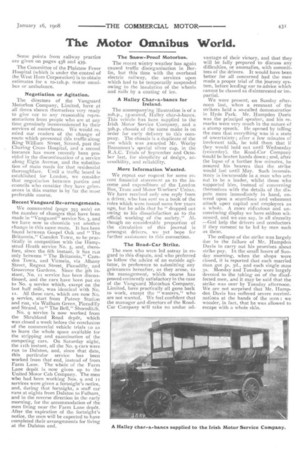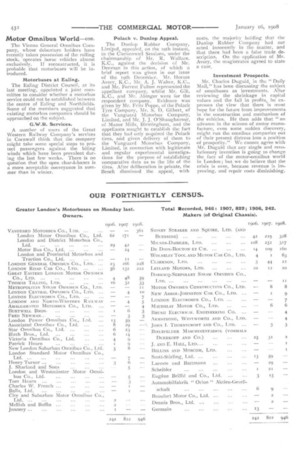The Motor Omnibus World.
Page 7

Page 8

If you've noticed an error in this article please click here to report it so we can fix it.
Some points from railway practice are given on pages 438 and 439.
The Committee of the Plaistow Fever Hospital (which is under the control of the \Vest Ham Corporation) is to obtain estimates for a to-12h.p. motor omnibus or ambulance.
Negotiation or Agitation.
The directors of the Vanguard Motorbus Company, Limited, have at all times shown themselves very ready to give ear to any reasonable representations from people who are at any time genuinely inconvenienced by their services of motorbuses. We would re_ mind our readers of the change of route which prevented this traffic along King William Street, Strand, past the Charing Cross Hospital, and a second instance has more recently been provided in the discontinuation of a service along Elgin Avenue, and the substitution of main roads for that residential thoroughfare. Until a traffic board is established for London, we consider that negotiation between parties and councils who consider they have grievances in this matter is by far the most preferable course.
Recent Vanguard Re-arrangements.
We commented (page 393 an e) on the number of changes that have been made in "Vanguard" service No. 3, and we have now to chronicle yet another change in this same route. It has been found between Gospel Oak and " The Britannia," Camden Town, to be practically in competition with the Hampstead Heath service No. 5, and, therefore, since the 6th instant, it has run only between "The Britannia," Camden Town, and Victoria, via Albany Street, Regent Street, Piccadilly, and Grosvenor Gardens. Since the 5th instant, No. it service has been discontinued, and the cars have been put on Lo No. 9 service which, except on the last half mile, was identical with No. I I. All these cars, which are now No. 9 service, start from Putney Station and run, via Walham Green, Piccadilly and Strand, to" The Bell," Shoreditch.
No. 9 service is now worked from the Shrubland Road depot, which was closed a week before the conclusion of the commercial vehicle trials to as to leave the whole space available for the stripping and examination of the competing ears. On Saturday night, the xith instant, all the No. 9 cars were run to Dalston, and, since that date, this particular service has been worked from that end, instead of from Farm Lane. The whole of the Farm Lane depot is now given up to the
United Motor Cab Company. The men who had been working Nos. 9 and ii
services were given a fortnight's notice, and, during that fortnight, a staff car runs at nights from Dalston to Fulham, and in the reverse direction in the early morning, for the accommodation of the men living near the Farm Lane depot.
After the expiration of the fortnight's notice, the men will be expected to have completed their arrangements for living at the Dalston end.
The Snow-Proof Motorbus.
The recent wintry weather has again caused traffic disorganisation in Berlin, but this time with the overhead electric railway, the services upon which had to be temporarily suspended owing to the insulation of the wheels and rails by a coating of ice.
A Halley Char-a-bancs for Ireland.
The accompanying illustration is of a 2oh.p., is-seated, Halley char-h.-banes. This vehicle has been supplied to the Irish Motor Service Company, and a 3oh.p. chassis of the same make is on order for early delivery to this company. The chassis is a duplicate of the one which was awarded Mr. Worby Beaumont's special silver cup, in the R.A.C. Trials of September and October last, for simplicity of design, accessibility, and reliability.
More Information Wanted.
We repeat our request for some recent financial statement as to the income and expenditure of the London Bus, Tram and Motor 'Workers' Union. We have received only one reply from a driver, who has sent us a book of the rules which were issued some few years ago, but he adds that he " dropped out owing to his dissatisfaction as to the official working of the society." Although no considerable proportion of the circulation of this journal is amongst drivers, we yet hope for further assistance in this connection.
The Road-Car Strike.
The men who were led astray in regard to this dispute, and who preferred to follow the advice of an outside agitator, in preference to submitting any grievances hereafter, as they arose, to the management, which course has proved eminently satisfactory in the case of the Vanguard Motorbus Company, Limited, have practically all gone back to work, except the " wasters," who are not wanted. We feel confident that the manager and directors of the RoadCar Company will take no undue ad
vantage of their victory, and that they will be fully prepared to discuss any difficulties, or anomalies, with committees of the drivers. It would have been better for all concerned had the men made a proper trial of the journey system, before lending ear to advice which cannot be classed as disinterested or impartial.
We were present, on Sunday afternoon last, when a remnant of the strikers held a so-called demonstration in Hyde Park. Mr. Hampden Davis was the principal speaker, and his remarks were very much in the nature of a stump speech. He opened by telling the men that everything was in a state of uncertainty; after a few minutes of irrelevant talk, he told them that if they would hold out until Wednesday (yesterday), the Road-Car Company would be beaten hands down ; and, after the lapse of a further few minutes, he assured his hearers that the strike would last until May. Such inconsistency is inexcusable in a man who sets out to be a leader, whilst those who supported him, instead of concerning themselves with the details of the dispute more immediately in hand, entered upon a scurrilous and vehement attack upon capital and employers as a whole. A more ridiculous and unconvincing display we have seldom witnessed, and we can say, in all sincerity —God help the drivers and conductors if they consent to be led by men such as these.
The collapse of the strike was largely due to the failure of Mr. Hampden Davis to carry out his promises about strike pay. In the small hours of Sunday morning, when the shops were closed, it is reported that each married man got 5s. 3d., and each single man 3s. Monday and Tuesday were largely devoted to the taking on of the disaffected men, and it may be said that the strike was over by Tuesday afternoon. We are not surprised that Mr. Hampden Davis has suffered severe recriminations at the hands of the men : we wonder, in fact, that he was allowed to escape with a whole skin. The Vienna General Omnibus Company, whose debenture holders have recently taken possession of the rolling stock, operates horse vehicles almost exclusively. If reconstructed, it is probable that motorbuses will be introduced.
Motorbuses at Ealing.
The Ealing District Council, at its last meeting, appointed a joint committee to consider whether a motorbus service could not be established between the centre of Ealing and Northfields. Some of the members suggested that existing motorbus companies should be approached on the subject.
G.W.R. Services.
A number of users of the Great Western Railway Company's services in Cornwall think that the company might take some special steps to protect passengers against the biting winds which have been prevalent during the last few weeks. There is no question that the open char-h.-banes is a more acceptable conveyance in summer than in winter.
Polack v. Dunlop Appeal.
The Dunlop Rubber Company, Limited, appealed, on the toth instant, to the Clerls:enwell Sessions, under the chairmanship of Mr. R. Wallace, K.C., against the decision of Mr. Denman in this action, of which a brief report was given in our issue of the t9th December. Mr. Horace Avory, K.C., Mr. A. J. Walter, K.C., and Mr. Forrest Fulton represented the appellant company, whilst Mr. Gill, K.C., and Mr. Abinger were for the respondent company. Evidence was given by Mr. Fritz Poppe, of the Polack Tyre Company, Mr. S. D. Gilbert, of the Vanguard Motorbus Company, Limited, and Mr. J. J. O'Shaughnessy, of Manor Mills, Birmingham, and the appellants sought to establish the fact that they had only acquired the Polack tires, and given delivery of them to the Vanguard Motorbus Company, Limited, in connection with legitimate and regular experimental investigations for the purpose of establishing comparative data as TO the life of the tires. After deliberation in private, the Bench dismissed the appeal, with
costs, the majority holding that the Dunlop Rubber Company had not acted innocently in the matter, and that there had been a false trade description. On the application of Mr. Avory, the magistrates agreed to state a case,
Investment Prospects.
Mr. Charles Duguid, in the " Daily Mail," has been discussing the subject of omnibuses as investments. After reviewing the shrinkage in capital values and the fall in profits, he expresses the view that there. is most hope for the future from improvements in the construction and mechanism of the vehicles. He then adds that " an advance in the science of motor manufacture, even some sudden discovery, might run the omnibus companies out of their present distress into a position of prosperity." We cannot agree with Mr. Duguid that any single and revolutionary invention is going to change the face of the motor-omnibus world in London; but we do believe that the crisis is over, because revenue is improving, and repair costs diminishing.




















